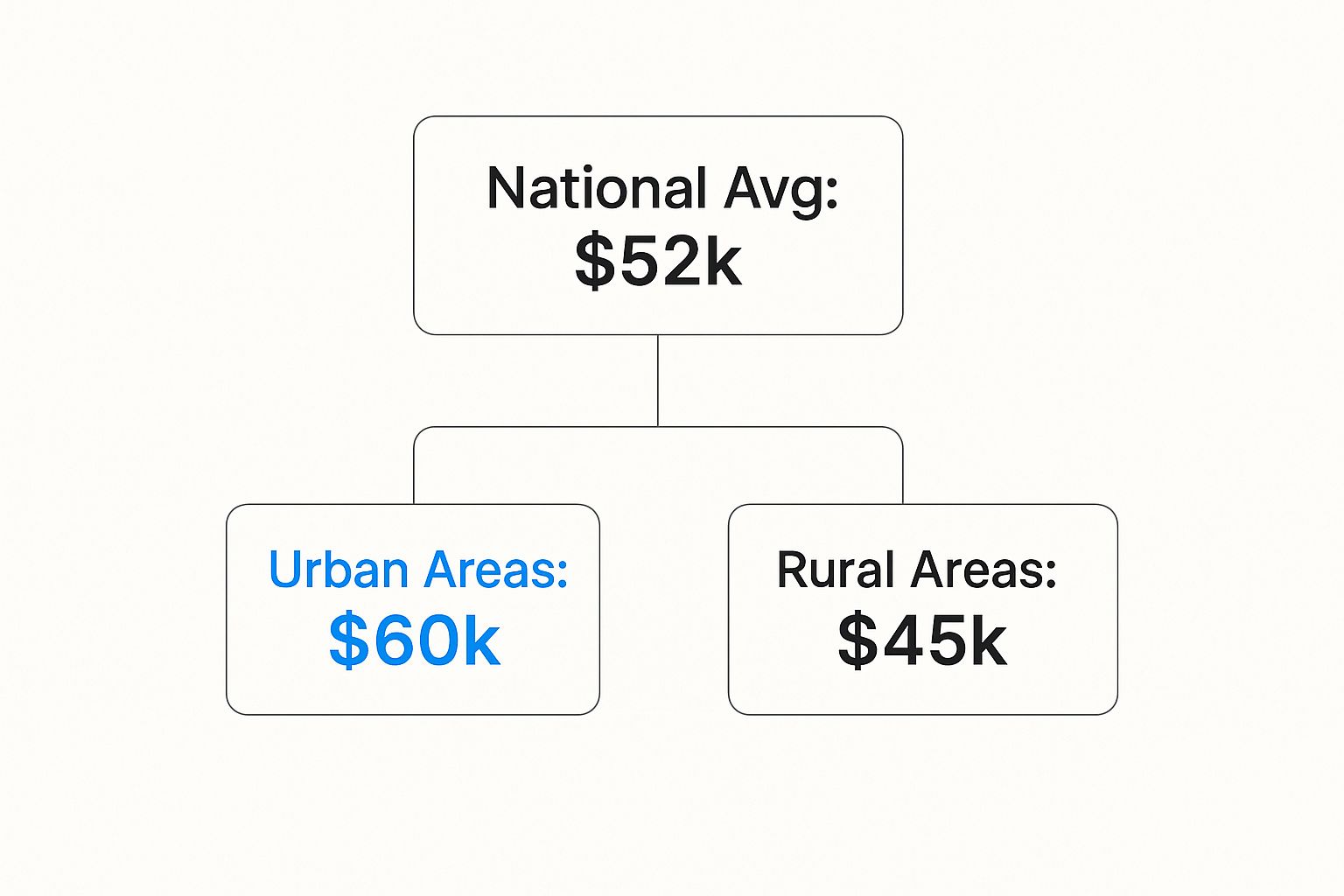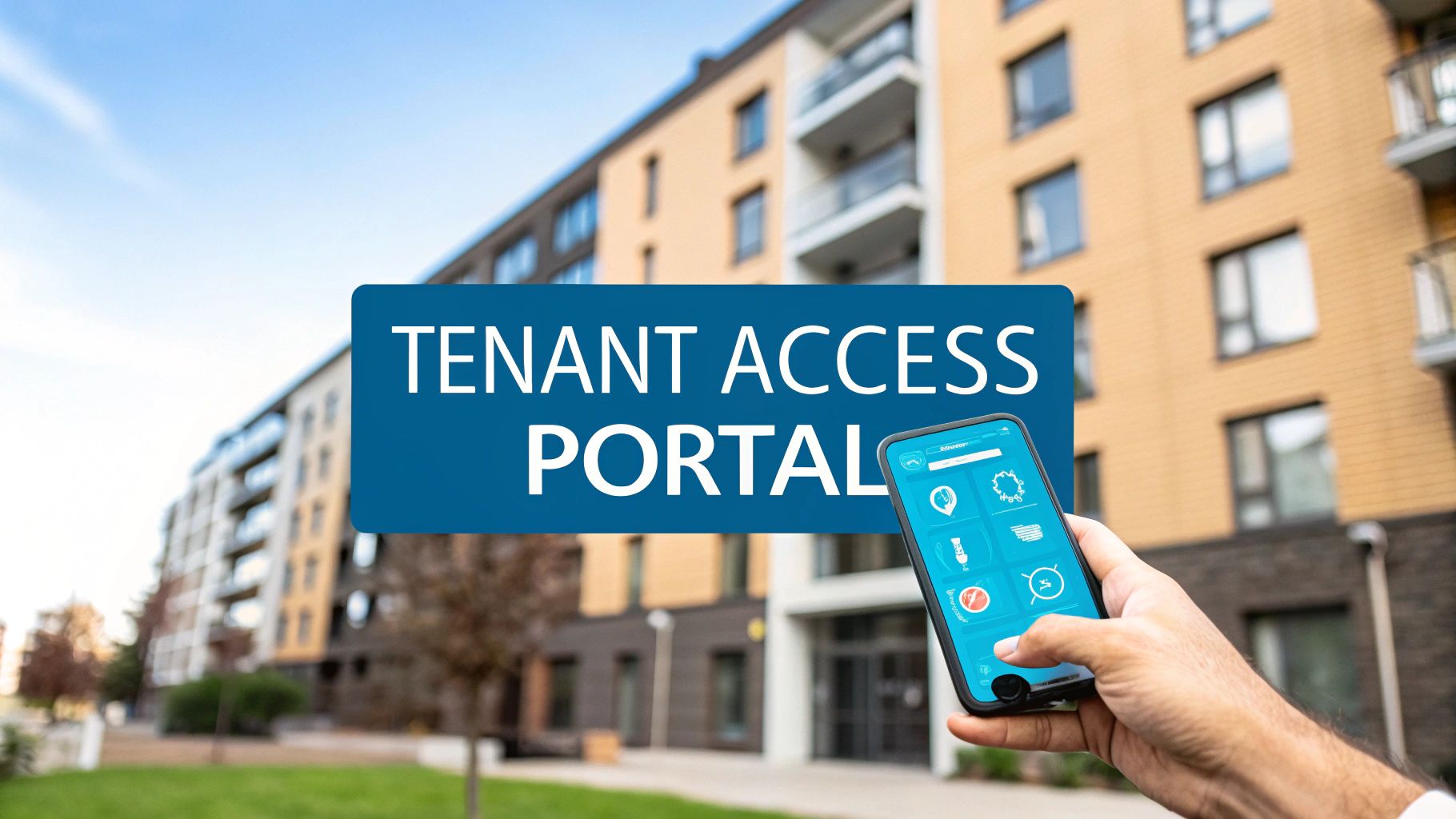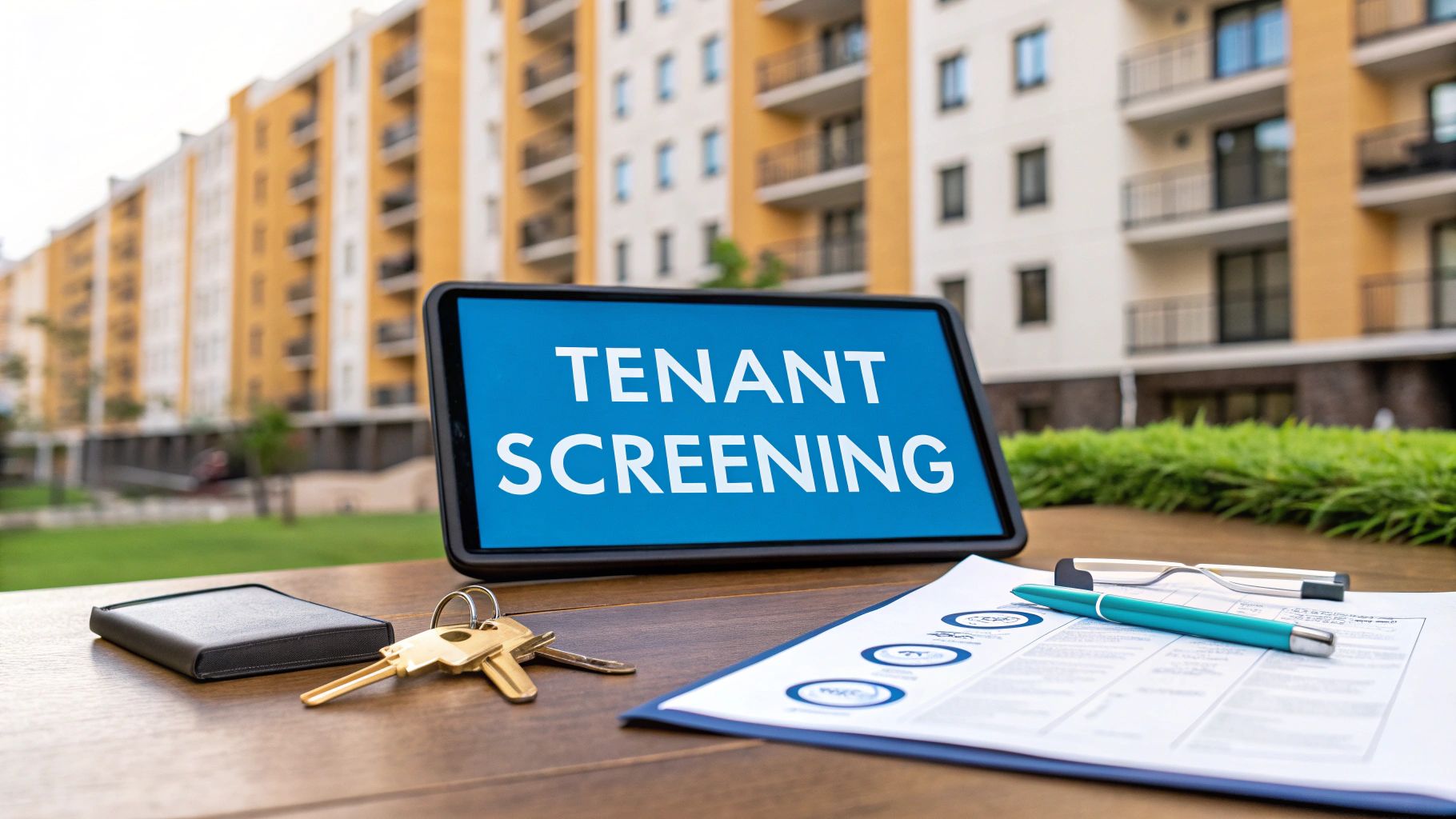When you see a headline figure like the average property manager salary, it's tempting to take it at face value. But the truth is, that number is just a starting point.
The national average for a property manager in the United States currently sits around $112,379 per year. That's a solid number, but it doesn't tell the whole story. Real-world salaries can swing from about $81,500 for someone just getting their feet wet to well over $151,000 for a seasoned expert running a large portfolio.
Think of it less as a fixed price and more like a baseline. Where you land on that spectrum depends on a whole host of factors we'll dig into.
What Is the Average Property Manager Salary

So, how much do property managers really make? To get a clear picture, we need to look beyond that single national average. A property manager's income is a dynamic figure, heavily influenced by things like experience, the city you work in, and the kinds of properties you oversee.
According to the latest industry data from early 2025, while the average salary is $112,379, the vast majority of professionals are earning somewhere between $96,239 and $132,758. That wide range is where the real story lies, showing just how much your specific circumstances can impact your earning potential. For a deeper dive, you can explore more detailed property manager salary benchmarks to see how these numbers break down.
A Closer Look at the Salary Spectrum
To make these numbers more concrete, let's connect them to real-world roles. A manager earning at the lower end of the scale is likely newer to the field, maybe handling a small handful of single-family homes in a quieter suburban area.
On the flip side, that six-figure salary north of $130,000 is typically earned by someone managing a massive commercial building, a portfolio of luxury apartment complexes in a place like New York or San Francisco, or a regional manager overseeing multiple teams.
This table gives a clearer idea of how salary and responsibilities grow together.
Property Manager Salary Spectrum in the US
This table shows the typical salary range for property managers, from entry-level to high-earning professionals.
As you can see, your first salary in property management is just a launchpad. It’s the strategic career moves, the specializations you pursue, and the on-the-ground experience you gain that will really push your income upward.
The rest of this guide will explore the specific factors—from the city you live in to the types of properties you manage—that decide exactly where you land on this spectrum.
Understanding the Key Factors in Your Pay

A property manager's salary isn't a simple, fixed number. Think of it more like a recipe, where several key ingredients mix together to determine the final paycheck. Understanding these ingredients is the first step toward boosting your earning potential and steering your career in the right direction.
When someone asks, "how much do property managers make?" the real answer depends on four pillars supporting your compensation. These are your professional experience, where your properties are located, the types of assets you manage, and the overall size of your portfolio.
Experience: The Foundation of Your Value
Just like in any profession, what you know and how long you've been doing it matters. A lot. An entry-level manager just learning the ropes will naturally earn less than a seasoned pro who can confidently navigate complex tenant disputes, forecast budgets, and oversee major capital improvements.
Your career journey has a direct line to your pay:
- Newer Professionals (0-3 years): You’re building your foundation. Your focus is on mastering the core tasks: collecting rent, communicating with tenants, and coordinating basic maintenance.
- Mid-Career Managers (4-10 years): You have a proven track record. Now you're tackling more complex challenges, from tricky evictions to managing vendor contracts and contributing to financial strategy.
- Senior Experts (10+ years): You are a strategic leader. Often holding designations like the Certified Property Manager (CPM), you’re overseeing large portfolios, managing other staff, and driving the financial performance of your assets.
Your salary grows as your ability to solve bigger, more expensive problems increases. An experienced manager isn't just paid for their time; they are paid for their judgment, which saves property owners significant money and reduces risk.
Moving up this ladder requires more than just putting in the time; it demands a deliberate effort to gain new skills and take on bigger responsibilities.
Location and Property Type: The Market's Influence
Where you work and what you manage are arguably the most powerful factors shaping your salary. Managing a portfolio of 50 single-family homes in a quiet Midwestern suburb is a fundamentally different job than overseeing a high-rise commercial building in downtown San Francisco. It's a different world.
The cost of living, the health of the local real estate market, and property values create wildly different salary benchmarks. Different property types also demand unique skill sets:
- Residential Management: Focuses on high-volume tenant relations and quick turnover.
- Commercial Management: Involves complex lease negotiations, long-term tenants, and specialized building systems.
- Industrial Management: Requires an understanding of logistics, zoning, and large-scale facility needs.
Each specialization carries its own set of challenges and, as a result, its own pay scale. Companies use sophisticated data to set these benchmarks. To get a better sense of how data-driven insights can shape pay decisions and provide a full picture of compensation trends, it’s worth looking into how HR analytics dashboards are used to track these metrics.
Ultimately, your earning potential reflects the value you create—and that value is directly tied to your experience, the complexity of the assets you manage, and the economic climate of your location.
How Geographic Location Shapes Your Income

When it comes to a property manager's salary, one factor trumps almost all others: geography. It’s a simple truth of the business—where you work has a massive impact on your paycheck. This isn’t just about big cities versus small towns; it’s about the unique economic heartbeat of your specific region.
Think of it this way: your salary is a direct reflection of the local economy. In a buzzing urban hub with a high cost of living, like San Francisco or New York City, all wages get pushed up to keep pace. A property manager in one of these metro areas could easily earn 20-30% more than someone with the exact same skills and experience in a more affordable town.
This isn't just a U.S. trend, either. It’s a global principle. A manager working in a fast-growing international tech hub will face completely different market forces than one in a quiet, established market. For instance, looking at global property manager salary benchmarks shows this in action, with UK-based managers earning an average of £45,000. The economic climate, cost of living, and local real estate demand are what really set the pay scale.
Digging Into Your Local Market
So, what are the gears turning behind the scenes that determine pay in your area? It really boils down to three core elements that create a distinct salary environment for every location.
- Cost of Living: This is the most obvious driver. When housing, food, and transportation cost more, companies have to offer higher pay to attract and keep good people.
- Real Estate Market Health: In a booming real estate market with soaring property values and high rental demand, the professionals managing those assets become more valuable. Their salaries naturally rise to reflect that.
- Rental Demand vs. Supply: In cities where renters are fighting over a limited number of units, property managers are essential for overseeing these high-value, income-generating assets. That high demand boosts their earning potential.
A property manager’s salary isn't just about their skills; it's about the economic context where those skills are put to work. The same job, done with the same expertise, can have a dramatically different market value just a few hundred miles away.
Comparing High and Low-Cost Areas
Let’s make this concrete. Imagine a property manager working in a high-growth city like Austin, Texas. They're likely overseeing brand-new apartment complexes with top-dollar rents and a constant stream of applicants from the booming tech industry. Their salary reflects the high stakes and breakneck pace of that market.
Now, picture a manager in a stable, lower-cost city like Cleveland, Ohio. They might be managing older, established properties. The core skills are the same—tenant relations, maintenance coordination, budgeting—but the economic pressures are entirely different. This results in a salary that makes sense for the local cost of living and property values. Understanding this dynamic is key to setting realistic expectations and spotting opportunities for your next career move.
Charting Your Career and Salary Growth
A career in property management isn’t a flat road; it’s a ladder with some very clear rungs to climb. Your starting salary is exactly that—a start. As you get your hands dirty, gain real-world expertise, and start taking on bigger responsibilities, your income potential grows right alongside it, shifting from day-to-day operational tasks to big-picture strategic leadership.
Most people get their foot in the door with a support role, like a leasing agent or an assistant property manager. This is where you learn the ropes: how to talk to tenants, coordinate maintenance, and handle the basic ins and outs of a lease. Think of this foundational experience as your launchpad. To really get a feel for this starting point, check out a detailed leasing agent job description to see how those duties build directly into a full management position.
The Climb From Assistant to Regional Manager
As you rack up experience, your title and your paycheck will evolve together. An Assistant Property Manager is typically in the trenches, handling daily tasks and supporting a senior manager. After a few years, you're ready to step into a full Property Manager role, where you take complete ownership of a property or maybe even a small portfolio.
The next major jump is to Regional Property Manager. This is a senior role where you're not just managing properties—you're managing other property managers across a whole geographic area. Your focus shifts to high-level financial performance and long-term strategy. It goes without saying that each step up this ladder comes with a hefty increase in responsibility and a much healthier salary.
This infographic really drives home how much location plays a role, highlighting the major pay differences between city and country markets.

The data is pretty clear: managers in bustling urban centers often earn significantly more. That's no surprise, given the higher cost of living and the sheer value of the properties in those areas.
Using Certifications as Career Accelerators
Want to fast-track your salary growth? Beyond just putting in the years, professional certifications are one of the best ways to do it. They act like a key, unlocking doors to more senior roles and higher pay grades. More than anything, they signal to employers that you are seriously committed to the profession and have mastered its complexities.
Certifications are so much more than just a few letters after your name. They are concrete proof of your expertise in financial management, ethics, and operational best practices, making you an incredibly valuable asset to any property owner or management firm.
Some of the heaviest hitters in the industry include:
- Certified Property Manager (CPM): This is the gold standard from the Institute of Real Estate Management (IREM). If you're an experienced pro, this is the one you want.
- Residential Management Professional (RMP): Perfect for managers who live and breathe residential properties.
- Certified Apartment Manager (CAM): A must-have certification for anyone managing multi-family communities.
Earning these credentials shows a level of professionalism that can directly lead to promotions and a much bigger paycheck. They arm you with the advanced skills needed to tackle larger portfolios and more complex assets, justifying a top-tier salary.
The Impact of Property Type and Portfolio Size
When asking, "how much do property managers make?" it's easy to overlook a critical detail: not all properties are created equal. The kind of asset you oversee and the sheer size of your portfolio are two of the biggest forces shaping your final salary. Picking a specialty isn't just a career choice—it's a financial one.
Think of it like being a doctor. A general practitioner has a wide range of skills, but a heart surgeon commands a much higher salary. Why? Specialized, high-stakes knowledge. It’s the same in our world. A manager handling a complex commercial office building will almost always earn more than someone managing a few residential duplexes. The job demands a totally different level of expertise in things like intricate lease negotiations, tenant improvement allowances, and large-scale building systems.
Specialization and Salary
Different property types bring their own unique challenges and, you guessed it, different pay scales. Choosing a specialty is one of the most strategic moves you can make for your career.
- Commercial Properties: This is where you'll often find the highest salaries. Managing office buildings, bustling retail centers, or massive industrial warehouses involves complex, long-term leases with tenants who have a lot on the line. The stakes are simply higher.
- Residential Properties: This bucket covers everything from single-family homes to large apartment complexes. While the base pay might not reach commercial levels, your ability to keep units filled can lead to some serious performance bonuses. Mastering how to lease properties quicker and cheaper is a skill that gets you paid.
- Affordable Housing: This is a specialized niche that requires a deep understanding of government regulations and strict compliance. It’s not for everyone, but the unique skill set it demands often translates to very competitive pay.
How Portfolio Size Multiplies Your Income
Beyond the type of property, the size of your portfolio is a direct income multiplier. Managing five single-family homes is a fundamentally different job than overseeing a portfolio of 150 units spread across multiple buildings. The bigger the portfolio, the more you need top-tier organizational skills, financial savvy, and, often, the ability to lead a team.
This reality is tied directly to the growth of our industry. The U.S. property management market is expected to jump from $81.52 billion in 2025 to almost $99 billion by 2029. This boom is fueled by a growing number of rental properties that need professional oversight. With about 35% of managers already handling portfolios of 100+ units, the ability to manage at scale is becoming more valuable every year. You can dive deeper into these trends with more property management industry statistics.
A larger portfolio doesn’t just mean more work; it means more responsibility and more value generated for the owner. A manager who can efficiently run 200 units, keeping them occupied and well-maintained, is a significant profit driver, and their salary will reflect that.
At the end of the day, your earning potential is directly tied to the complexity and scale of the problems you solve. By strategically choosing a high-value property type and proving you can handle a large, demanding portfolio, you put yourself in the driver's seat of your career and salary growth.
Frequently Asked Questions About Property Manager Pay
As you start to map out your career in property management, you're bound to have questions about what it really takes to succeed and, of course, how the money works. Let’s tackle some of the most common things people wonder about when they look into what a property manager actually earns.
Can You Be a Property Manager Without a Degree?
Absolutely. While a degree in business or real estate certainly doesn’t hurt, it's far from a requirement to get into the game. Many of the most successful people in this field started out in roles like leasing agent or assistant property manager and simply learned the ropes on the job.
What really matters are your skills and official qualifications. Most states will require you to get a real estate license, which means taking some courses and passing an exam. Honestly, this is often a much bigger deal to employers than what your college major was.
Beyond that, it’s all about what you can do. Are you a great communicator? Do you have a head for numbers and budgets? Can you solve problems on the fly? These are the real cornerstones of a great property management career. Industry certifications, which we’ll get to, also carry a ton of weight.
What Is the Highest-Paying Property Management Job?
The biggest paychecks usually go to those in executive-level roles at massive real estate investment trusts (REITs) or national management firms. We’re talking titles like Director of Property Management or Regional Vice President, which often pull in compensation well into the six-figure range, plus hefty bonuses and sometimes even a piece of the pie through equity.
These top-tier pros aren't just managing a few buildings; they're overseeing huge portfolios and leading teams of other managers. Their job is all about strategy—squeezing every last drop of financial performance out of high-value properties.
The highest earners are almost always specialists. They focus on complex, high-value asset classes like downtown commercial office towers, sprawling industrial parks, or large-scale luxury multi-family communities where the financial stakes are highest.
Their deep, niche expertise is what makes them so valuable to investors and justifies the premium pay.
How Do Property Managers Get Paid?
How you get paid in this industry usually falls into one of a few common buckets. The structure that's right for you often depends on whether you're working for a big company or striking out on your own.
There are three main ways property managers make their money:
- Fixed Annual Salary: This is the most common setup if you're an employee at a larger property management company. You get a steady, predictable paycheck, often sweetened with bonuses for hitting performance goals.
- Percentage of Rental Income: If you're an independent manager or with a smaller firm, you're often paid a cut of the monthly rent you collect. This fee typically lands somewhere between 8% and 12% of the gross monthly rent, which directly ties your earnings to how well you run your properties.
- Hybrid Model: Some jobs mix it up, offering a lower base salary but adding on a smaller percentage of rental income or significant bonuses. These bonuses are almost always tied to specific goals, or KPIs, like keeping occupancy high, tenant turnover low, and expenses under budget.
And if you’re drawn to the high-stakes drama and lifestyle that can come with real estate, you might get a kick out of these popular real estate shows to watch, which often give a glimpse into the pressures and rewards of the business.
Ready to stop juggling showings and start growing your portfolio? Showdigs offers an AI-powered leasing platform with on-demand agents to automate your entire leasing funnel, from lead to lease. Learn how you can reduce vacancy times and streamline operations at https://showdigs.com.







